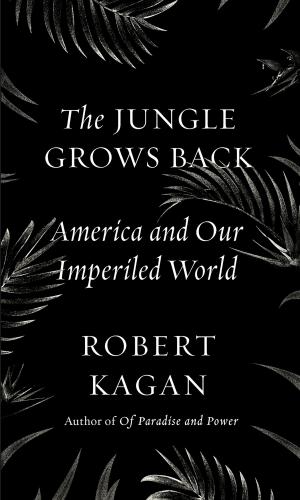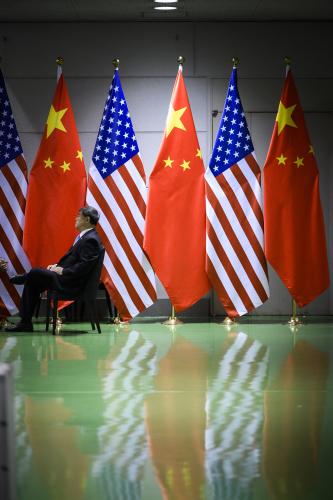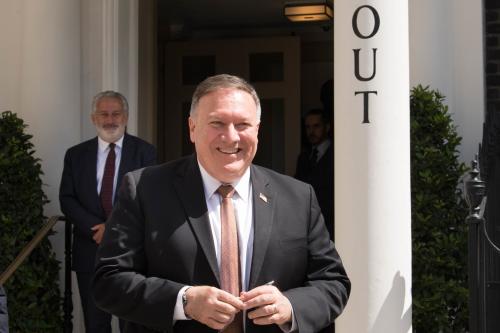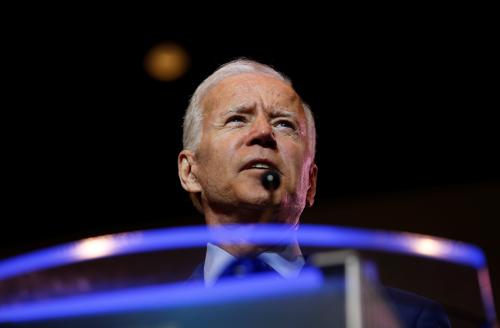That Chinese President Xi Jinping has now decided to end the Hong Kong charade once and for all has ominous implications for Taiwan, writes Robert Kagan. Is the United States prepared to go beyond statements and sanctions? This piece was originally published in the Washington Post.
When the Japanese invaded Manchuria in 1931, and the United States and the League of Nations began peppering them with public notes and statements calling on them to desist, humorist Will Rogers observed that, “every time they get another note they take another town.” “We had better quit writing notes,” he suggested, or soon they “will have all China.” Six years later, the Japanese did try to take all of China, and more. A major reason was that Japanese leaders believed, and the Manchurian crisis offered the first clear evidence, that the United States was ultimately not prepared to back up its denunciations with force.
Today, we hurl condemnations and warnings at China for extinguishing freedom in Hong Kong, brutally oppressing the Uighur Muslim minority and making aggressive military moves along the Indian border, in the South China Sea and the East China Sea. We ban Chinese companies, engage in tariff wars and excoriate the Chinese for their role in spreading the novel coronavirus. Our political parties compete to outdo each other in anti-Chinese rhetoric and policy proposals. And so far, our words and sanctions have been cost-free. But if this confrontation were to move to the next level, would we be ready, materially and psychologically?
We may soon find out. There has never been any mystery about what Chinese President Xi Jinping wants, because it is what Beijing has wanted for decades: to make the Chinese nation whole again, to subdue opposition in Xinjiang and Tibet, to control the South China Sea and certain strategically located islands in the East China Sea, to regain Hong Kong, taken by the British in the 1840s, and to “reunite” Taiwan with the mainland under the Chinese Communist Party’s rule. These are fixed goals, much as it was Japan’s fixed goal in the 1930s to expand control of the Asian mainland. The only questions have been about means and timing.
For most of the past few decades, Beijing’s approach has been relatively patient and peaceful. Wary of tangling with the United States militarily, and fearful of being politically and economically isolated in a hostile world, as China was for a time after the Tiananmen Square massacre in 1989, the Chinese have hoped to accomplish their objectives largely by using their growing economic clout.
Until recently, they were fairly successful. In the 1990s, the powerful lure of the vast Chinese market was enough to overcome Western discomfort with Beijing’s domestic oppression. American corporations essentially dictated U.S. policy during the Clinton years, leading first to the granting of most-favored-nation status and admission to the World Trade Organization, then to the transfer of Hong Kong on the terms demanded by Beijing.
That agreement, with its lofty promises of “one country, two systems,” was a fig leaf, as most knew at the time — a sop to Western consciences guilty for condemning the people of Hong Kong to their ultimate fate as wards of Beijing. What is happening today is exactly what was predicted and exactly what Chinese leaders intended. Our outrage, while appropriate, is also embarrassing.
But for China, the subjugation of Hong Kong may be the last great fruit of the peaceful, economic approach. The liberal capitalist world has become steadily less enthralled by the money to be made in China and more concerned about Chinese economic competition, both fair and unfair, and nervous about China’s mastery of the new information technologies and the acquisitive expansionism of its Belt and Road project. Since the late Obama years, the American mood has shifted from welcoming to fearing China’s economic success.
That has raised important questions for Xi and his colleagues. If the peaceful, economic route to their goals is closing, is it time to shift to more forceful means? Is it time to start making use of the military capacity they have spent more than two decades and hundreds of billions of dollars building?
Taiwan is likely to be the place where these questions are answered. For more than two decades, Beijing governments have tried to cajole and coerce the Taiwanese through a combination of economic inducements and diplomacy, and the ever-present threat of force. For much of this time, the Chinese appeared to believe they were making progress, especially during the years 2008-2016, when Taiwan’s President Ma Ying-jeou made gestures toward unification.
Meanwhile, Beijing moved cautiously in Hong Kong, knowing that harsh suppression of its freedoms could frighten many Taiwanese into the arms of pro-independence advocates. And indeed, the crackdown on Hong Kong protesters last year probably played a role in the overwhelming reelection victory in January 2020 of the more independence-minded party of President Tsai Ing-wen.
That Xi has now decided to end the Hong Kong charade once and for all has ominous implications for Taiwan. China can launch devastating missile strikes against Taiwan in the first 24 hours of a conflict, leaving Taipei a choice between surrendering and holding out to see whether the Americans will arrive in time to prevent total annihilation.
If China can achieve unification, the political and strategic shift in Asia would be world-altering — especially given the Trump administration’s recent strengthening of ties with Taiwan. A U.S. failure to prevent Taiwan’s military defeat and absorption would send shock waves throughout the region and beyond. Japan, Korea and other regional players would likely rethink their relationship with the United States. And a China in possession of Taiwan would be poised to dominate East Asia and the western Pacific as never before, scrambling the entire global strategic equation.
This would be a historic accomplishment for Xi, but there are also huge risks. Trying to take Taiwan and failing would be catastrophic, both to Xi personally and possibly to the regime itself. As with Japan in the 1930s, much will depend on how the Chinese read the Americans right now — what they think President Trump is likely to do, what policies they think a Biden administration is likely to pursue.
Is the Trump administration ready to respond to a Chinese attack or threatened attack on Taiwan? Would a Biden administration be? Are the American people? Are we prepared to go beyond statements and sanctions if the Chinese call our bluff? American policies in the two decades before World War II were shaped by what in retrospect looks like a stunning naïveté about other nations’ willingness to resort to force. One wonders if we are any less naive today.
The Brookings Institution is committed to quality, independence, and impact.
We are supported by a diverse array of funders. In line with our values and policies, each Brookings publication represents the sole views of its author(s).










Commentary
China’s dangerous Taiwan temptation
August 20, 2020